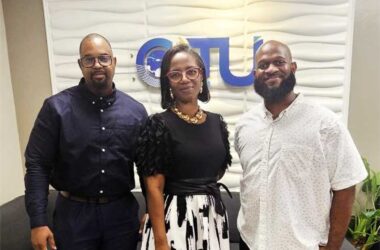A Caribbean sanitation project, appropriately called CARIBSAN, using natural means today to address and redress an age-old waste water problem, has taken the project to another essential stage, this time in the biggest Caribbean involved.
The Saint Lucia-based Caribbean Association for Water and Sanitation (CAWASA) is involved in the regional project and Executive Director Ignatius Jean attended meetings in Cuba.
Jean told The VOICE the project, involving use of the regionally-popular ‘Bird of Paradise’ plant to treat wastewater naturally was “continuing to make progress” and the May 16 to 22 visit to Havana, was “the first face-to-face meeting of all the partners” of the CARIBSAN project, which is participating in the regional project alongside Dominica and Saint Lucia.
In addition to the technical activities for the development of planted waste water filters, the CAWASA official said the trip to Cuba also allowed for “diplomatic exchanges between the island nations around sanitation, which is a shared economic, social and ecological issue.”
The institutional and technical mission in Cuba was the 5th Steering Committee meeting of partners and the first face-to-face meeting of stakeholders since the launch of the INTERREG Caribbean project in September 2021.
At the end of the mission, a Framework Partnership Agreement was signed by the various representatives of the institutions involved in developing the technology of using planted filters as a wastewater treatment technique in the Caribbean.
Jean says CARIBSAN’s technical purpose “is to build filter treatment plants in each partner country,” starting in Cuba, Dominica and Saint Lucia, modeled on existing wastewater treatment plants developed in Martinique and Guadeloupe.
Planted Filter Sanitation Technology makes proper use of nature-based processes, as planted filters have the advantage of being ‘efficients’ (high in treatment efficiency), simpler and less expensive than conventional wastewater treatment systems.
They can cope with tropical weather events such as heavy rains or cyclones and are a diverse family.
Some processes allow water and sludge to be treated together, which are often problematic as waste.
According to Jean, “For several years, the filter treatment plants at the François and Diamant districts in Martinique highlighted the effectiveness of this economic, ecological and climate-resilient technology.”
He added, “Beyond sharing the technology, the project always aims to increase Caribbean cooperation in the field of sanitation, as a major common environmental and health issue, by arranging meetings and visits to various public and private plants in participating countries.”
Indeed, he observed that “the sharing of a common coastline degraded by wastewater leads participating entities to share the feedback between neighboring islands, as happened following a 2021 visit to the successful Martinique pilot plants.”
The week-long Cuba visit, he said, allowed for discussion on technical exchanges and progress on the technical aspects and under the leadership of the First Vice-President of Water in Cuba.
Discussions at the political level took place on several occasions, in the presence of the Ambassadors to Cuba of Antigua and Barbuda, St. Lucia, Dominica, the European Union (EU) and the French Development Agency (AFD).
The Office of Water (ODE) of Martinique, as leader of the CARIBSAN project, was represented at the Cuba meetings and visits by its President Lucien SALIBER and the institutional delegation comprised representatives from Dominica and St Lucia, as well as the CAWASA Executive Director and the Directorates-General of the ODEs in Paris and Martinique.
The technical delegation comprised engineers from the International ODE, the main operator of the project, scientists from INRAE, and the engineer project manager from ODE Martinique.
Partners also attended the presentation of theses on Planted Filters by young Cuban engineers on design methodologies of artificial wetlands adapted to the Cuban context.
The participants also went on field visits to the Luyanó Waste Water Treatment Plant in Havana, the National Botanical Garden (for presentation of potentially-usable local plants), as well as the site of the sewerage and drinking water pipe production plant (unique in Caribbean region).
The teams also visited the HYDROPLAST plumbing and sewerage production company and witnessed training on artificial wetlands at the CUJAE Hydraulic Research Center of the Technological University of Havana, as well as potential sites pre-selected for the future construction of a planted filter plant.
In the neighborhood of Pogoloty, the partners exchanged with the Delegate and President of the People’s Council and the inhabitants.
Sarduy specified that at the national level, the work will not be limited to Havana, as, in cooperation with the AFD and EU, they will organize a strategy to allow the application of filters planted in other provinces.
According to Jean, “The Cuban government has emphasized the importance of this cooperation program and has indicated the planted filters will be included in Cuba’s future national sanitation planning.”
The meeting also shared information about the launch of a new website by HUPANAM, a network of scientists and technologists seeking to spread knowledge about the use of planted filters for wastewater treatment.
On their website are publications and guides about planted filters and examples of stations in several countries, including Argentina, Brazil Colombia, Mexico and Portugal.
During the closing session, stakeholders ratified the Caribbean Cooperation Agreement for Water Treatment in the Caribbean.
During the discussion on the Protocol Act, Saliber described the week in Cuba as “a fruitful period that demonstrated the regional capacity to overcome the challenges of hydraulic sanitation.”
Jean said the participants in the first mission to Cuba concluded it fully demonstrated the strong interest of the partners and was crowned with success, thanks to the high-level professionalism of the Cubans and the warm welcome they received.
The Cuba meetings and visits came ahead of the upcoming CARIBSAN regional conference to be held in Martinique in early December 2022.
The mission to Havana ended with the signing of the Cooperation Convention and the first CARIBSAN pilot planted filter treatment plants are expected in each territory by 2024.













